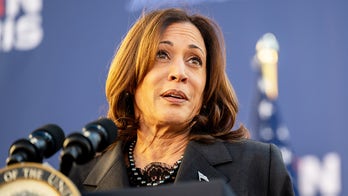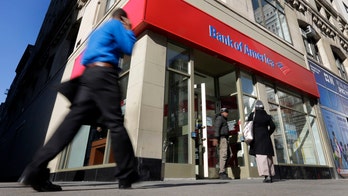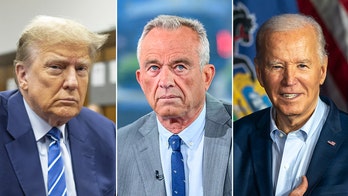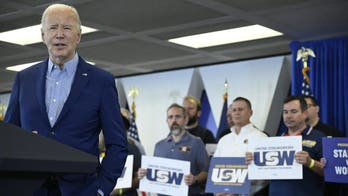“Embassy Tripoli reports the group claimed responsibility on Facebook and Twitter and has called for an attack on Embassy Tripoli.”
-- State Department email obtained by FOX News showing that within two hours of the attack on the U.S. consulate in Benghazi, Libya hundreds of Obama administration officials had been alerted to the potential role of al Qaeda-affiliate Ansar al-Sharia.
If Barack Obama fails in his bid for a second term as president, historians and political analysts will spend years trying to answer why and how he and his administration so badly mishandled the attack on the U.S. consulate in Benghazi, Libya.
The question will linger for many years: Since it was clear that he and his team knew that Islamist militants were to blame, why did the president move off of his initial response and try to minimize the role of al Qaeda?
Republican presidential nominee Mitt Romney felt the need to stay statesmanlike and focus on his own credentials as commander-in-chief more than prosecuting Obama’s ongoing struggle in their final debate. But as the clock ticks toward Election Day, the debacle in Benghazi and the botched public response to it have proven to be one of the embattled incumbent’s greatest liabilities anyway.
A president who had hoped to make foreign policy a central point in his re-election case instead is confronted with a stream of evidence that the raid might have been foiled with adequate security and that the story Obama and his team told the public about the attack being a spontaneous event was at odds with lots of evidence to the contrary.
State Department emails obtained by FOX News colleague Chad Pergram show that even as the fighting continued between Islamist militants and the tiny, doomed garrison at the U.S. outpost in Benghazi, high-ranking officials had reason to believe an al Qaeda was involved.
This comes on the heels of the revelation that top officials, and perhaps even the president himself, were able to watch the hours-long battle in real time as U.S. drone aircraft circled the besieged compound filming the slow-motion massacre.
The president knew, or ought to have known, about the involvement of al Qaeda and may have seen the attack unfold. In speeches the next day, he certainly suggested that he understood what had happened, referencing acts of terror in his Rose Garden remarks and then more explicitly calling the raid “terror” in a campaign speech in Las Vegas that night.
But then the administration and the president wheeled around and began focusing more on a YouTube video that was deemed offensive by Muslims. Rather than staying on his language about defiance in the face of terror and promising retribution, Team Obama backpedaled for two weeks, abandoning the president’s first posture.
That was a grave error.
Presumably, the decision to emphasize the idea of a spontaneous attack was intended to shield Obama from the question of how, given the warnings and given that it was the anniversary of 9/11, his team had allowed the attack to succeed.
[pullquote]
Or how could American officials watch the massacre in real time but not send any aid to the doomed garrison? Or how had the situation in Libya, the centerpiece in Obama’s Middle East policy, so devolved that such a brazen attack was even possible?
Rather than face those questions, Obama sought to shift blame to the filmmakers and absolve his team of liability. But as evidence mounted that al Qaeda was involved and the president’s team knew it, the administration shifted back to a premeditated attack by Islamist militants.
When it was finally revealed that there had been no riots at all before the attack, the video gambit was completely unraveled. The storyline that Obama had adopted – that well-armed militants spontaneously took advantage of the chaos spurred by the video – was kaput.
Obama took a risk in trying to mitigate his own administration’s culpability – rejected requests for additional security, mounting warnings of al Qaeda activity, probing attacks months before on the compound and not being adequately on guard on the 9/11 anniversary.
And while Obama liked to highlight how he and his team watched live as Usama bin Laden was snuffed in Pakistan nearly two years ago, he could not have liked the idea that people might know there was a live stream of the attack in Benghazi.
In hindsight, the correct answer would have been for Obama to clear his campaign schedule the day after the attack and huddle with his security team rather than campaigning. He also should have stayed with his first public response of talking about bringing terrorists to justice. Republicans would have howled about the security failures and missed warnings, but that would have been mostly drowned out by coverage of the president’s get-tough response.
But the president flinched and opted instead to try to sidestep the expected partisan response and minimize the role of terrorism in the attacks.
That was back when Obama looked to be on a glide path to a second term and was probably unwilling to highlight any international incident that could lessen his luster on terrorism. So on Sept. 12, it was terrorism, but for the two weeks that followed it was “under investigation.”
Had he stuck with terrorism and played up a tough, focused executive response, he might have seen the nation rally around him. But instead, the president opened up a line of questioning that will haunt him right up to Election Day and, if he loses, for years thereafter.
And Now, A Word From Charles
“So what can they offer? He's not going to -- he could have done a Clinton and gone back to the center as he did in '96 and sort of triangulated and proposed a lot of centrist stuff, and that's not Obama. It's not who he is. And he doesn't have an agenda. Everybody knows it. And he's run on kill Romney. And that worked because he had all the money and there were no answers to all those ads until the first debate. And he's run out of ideas. That's his problem right now.”
-- Charles Krauthammer on “Special Report with Bret Baier.”
Chris Stirewalt is digital politics editor for Fox News, and his POWER PLAY column appears Monday-Friday on FoxNews.com. Catch Chris Live online daily at 11:30amET at http:live.foxnews.com.




